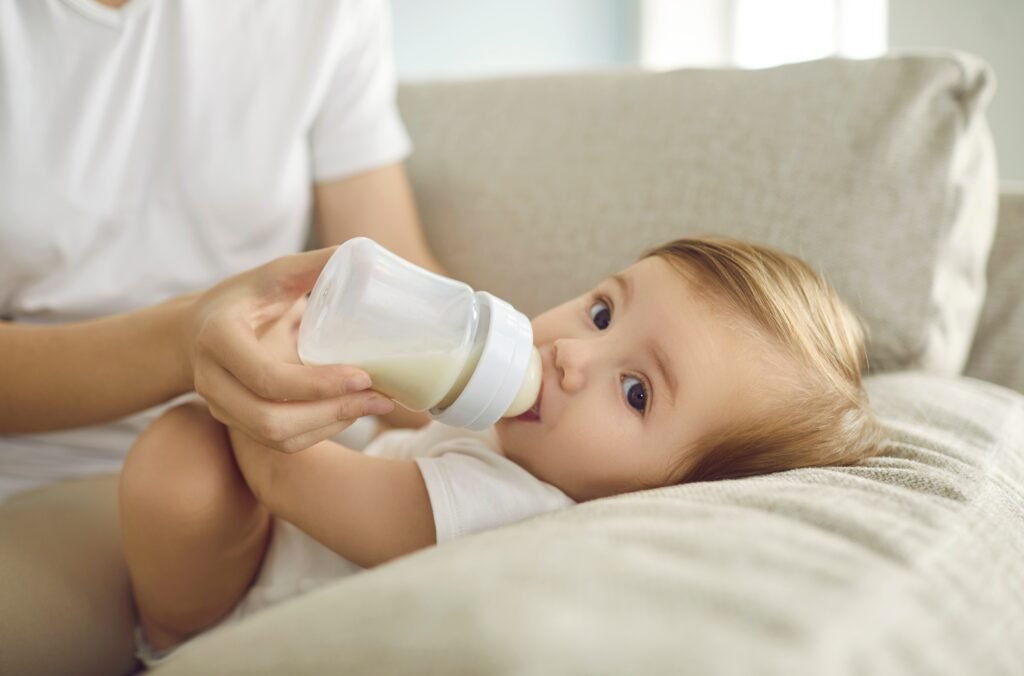Welcome to Little Smiles of Beverly Hills, your trusted pediatric dentistry resource! We’re here to provide you with all you need to know about Baby Bottle Tooth Decay: a comprehensive prevention guide for parents.
Baby bottle tooth decay, also known as early childhood caries, is a preventable condition that can significantly impact an infant or young child’s oral health. It primarily affects the front teeth and is caused by frequent and prolonged exposure to sweetened liquids, including milk, formula, and fruit juices, often from baby bottles or sippy cups. Bacteria in the mouth feed on these sugars, producing acids that erode tooth enamel and lead to tooth decay. Pacifiers dipped in sugary syrups can also contribute to this form of tooth decay.
Maintaining healthy primary (baby) teeth is crucial for a child’s overall development. They play a vital role in proper chewing, speech development, and holding space for permanent teeth. Neglecting baby bottle tooth decay can lead to pain, infection, and potential orthodontic issues in the future.

Understanding the Causes of Early Childhood Caries
Understanding tooth decay is the first step to prevention. Let’s look at the primary culprits behind baby bottle tooth decay:
- Frequent and prolonged exposure to sugary liquids: When children fall asleep with a baby bottle containing milk, formula, juice, or other sweetened drinks, the liquid pools around the teeth, providing a constant sugar source for bacteria. Saliva flow, which helps rinse away food particles and neutralize acids, is also reduced during sleep. This is a common cause of baby bottle tooth decay. The use of a baby bottle for prolonged periods significantly increases the risk.
- Sugared pacifiers: Dipping pacifiers in honey, syrup, or other sweet substances can also expose a child’s teeth to prolonged sugar contact, contributing to tooth decay.
- Transmission of bacteria: Parents can inadvertently transmit decay-causing bacteria to their child through saliva exchange, such as by sharing spoons or cleaning pacifiers by putting them in their own mouths. This habit can contribute to severe baby bottle issues.
Spotting the Signs: Recognizing Dental Decay in Infants
Early detection of tooth decay is vital. It’s important to be aware of the signs of baby bottle tooth decay so you can seek early intervention.
| Stage of Decay | Appearance of Teeth | Location |
| Early | White spots or dull areas on the tooth surface | Often along the gum line, especially on upper front teeth |
| Moderate | Light brown or yellow discoloration, rough texture | Spreading on the tooth surface, sometimes visible from the front |
| Advanced | Dark brown or black areas, visible holes (cavities) | Extensive damage, may involve multiple teeth, can lead to pain and infection |
Preventing Baby Bottle Tooth Decay: Effective Strategies
Effective prevention of tooth decay requires consistent effort. Preventing baby bottle tooth decay is entirely achievable with consistent effort and adherence to specific guidelines. At Beverly Hills Dentistry, we emphasize preventive care because your child’s smile is precious.
Optimal Oral Hygiene Practices for Your Little One
- Clean Gums and Teeth Regularly:
- Before Teeth Erupt: After every feeding, gently wipe your baby’s gums with a clean, damp washcloth or gauze. This removes milk residue and massages the gums.
- First Tooth Appears: Begin brushing your child’s teeth as soon as the first tooth emerges.
- For children under two, use a fluoride-free toothpaste or no toothpaste at all.
- For children who can spit out excess toothpaste (typically around age two), transition to a pea-sized amount of ADA-approved fluoridated toothpaste.
- Flossing: Once teeth begin to touch, it’s important to start flossing.
- Parental Assistance: Continue to clean your child’s teeth until around age seven, as children often lack the dexterity to reach all areas of their mouths effectively.
Smart Feeding Habits to Avoid Tooth Erosion
- Mind Baby Bottle and Sippy Cup Contents:
- Water is Best: Only put water, breast milk, or formula in baby bottles and sippy cups. Avoid filling them with sugary drinks like fruit juices, sodas, or sweetened teas.
- No Baby Bottles to Bed (Except Water): Never allow your child to fall asleep with a baby bottle containing anything other than water. If they insist on a baby bottle for comfort, fill it with plain water. For safe oral hygiene, ensure your baby’s bottle is only filled with water at night.
- Encourage Cup Use:
- Transition Early: Encourage your child to transition to a regular cup by their first birthday. This reduces prolonged exposure of teeth to liquids. Avoid prolonged use of the baby bottle after 12 months.
- Avoid Sugared Pacifiers:
- Never dip pacifiers in sweet liquids, honey, or sugar.
- Promote a Healthy Diet:
- Reduce Sugar Intake: Gradually reduce and eventually eliminate sugar-filled snacks and sweetened drinks from your child’s diet. Aim to replace sweetened beverages with pure water.
Professional Dental Guidance for Your Child’s Smile
- Ensure Adequate Fluoride:
- Fluoride strengthens tooth enamel and helps prevent cavities. Consult with your pediatric dentist or doctor to discuss your child’s fluoride levels and whether supplementary fluoride is needed, especially if your local water supply is not fluoridated.
- Regular Dental Check-ups:
- Regular dental appointments are key. Schedule your child’s first dental visit around their first birthday or within six months of their first tooth erupting. Regular check-ups allow the dentist to monitor oral health, provide preventive care, and address any concerns early on.
Prevention Checklist for Parents: A Guide Against Tooth Decay
Use this checklist to ensure you’re taking all necessary steps to prevent baby bottle tooth decay:
| Prevention Action | Frequency/Timing | Notes |
| Wipe gums/brush teeth | After every feeding (gums), twice daily (teeth) | Use damp cloth for gums, soft brush for teeth |
| Use fluoride-free toothpaste | For children under 2 years | Transition to pea-sized fluoridated toothpaste when child can spit |
| Avoid sugary drinks in baby bottles/cups | Always | Stick to water, breast milk, or formula |
| Limit baby bottle use at bedtime | Always | Only water in baby bottles at night |
| Encourage regular cup use | By 12 months | Transition away from baby bottles |
| Never sugar pacifiers | Always | Keep pacifiers clean and plain |
| Limit sugary snacks/drinks | Daily | Promote a balanced, nutritious diet |
| Ensure adequate fluoride | Consult dentist/doctor | Discuss water fluoridation and supplements if needed |
| Schedule first dental visit | Around 1st birthday / 6 months after first tooth | Essential for early assessment and advice |
| Assist with brushing | Until age 7 | Help ensure thorough cleaning |
By following these preventive measures, parents can significantly reduce the risk of baby bottle tooth decay, ensuring their child develops a healthy, beautiful, and decay-free smile. For expert guidance on baby bottle tooth decay, visit your Beverly Hills dentist. Our dentistry team at Little Smiles of Beverly Hills is committed to your child’s healthy smile.
Q&A About Infant Tooth Decay
Many parents wonder about the role of the baby bottle in their child’s sleep routine. Your dentist can provide personalized advice. Seeking professional dental guidance is encouraged for all your child’s oral health queries.
Common Questions Answered
Baby bottle tooth decay, or early childhood caries, is a severe form of tooth decay that affects infants and young children, primarily their front teeth. It’s caused by frequent and prolonged exposure to sugary liquids.
The primary causes are allowing a child to fall asleep with a baby bottle containing milk, formula, juice, or other sugary drinks, or by constantly sipping on such liquids throughout the day. Dipping pacifiers in sweet substances also contributes to tooth decay.
Early signs include dull white spots or streaks on the teeth, especially near the gum line. As it progresses, these areas can turn light brown, yellow, or even black, and visible holes (cavities) may form, indicating tooth decay.
You should start cleaning your baby’s gums with a damp cloth even before teeth appear. Begin brushing gently with a soft-bristled toothbrush as soon as the first tooth erupts.
For children under two, use a fluoride-free toothpaste or no toothpaste at all. Once your child is able to spit out toothpaste (usually around age two), you can use a pea-sized amount of ADA-approved fluoridated toothpaste.
It’s recommended that your child has their first dental visit by their first birthday, or within six months after their first tooth appears.
Yes, if pacifiers are dipped in honey, syrup, sugar, or other sweetened liquids, they can contribute to tooth decay by providing a constant sugar source for bacteria.
Yes, even 100% fruit juice contains natural sugars that can contribute to tooth decay if consumed frequently or in large amounts. It’s best to offer water primarily, and if juice is given, it should be diluted and offered in a regular cup at meal times, not in a baby bottle or sippy cup throughout the day.
If your baby needs a baby bottle for comfort at bedtime, fill it with plain water only. Avoid putting milk, formula, or juice in the baby bottle when they go to sleep.
Primary teeth are crucial for several reasons: they help children chew food properly, aid in clear speech development, maintain space in the jaws for permanent teeth, and contribute to a child’s overall self-esteem and facial development. Premature loss of baby teeth due to tooth decay can lead to permanent teeth erupting incorrectly and potential orthodontic issues. A pediatric dentist specializes in children’s oral health.
Safeguarding Little Smiles for a Lifetime of Oral Health
Baby bottle tooth decay is a serious but entirely preventable condition. By understanding its causes, recognizing the early signs, and diligently following the preventive strategies outlined above, you can empower your child with a lifetime of healthy, strong teeth. Regular oral hygiene, mindful feeding practices, and consistent dental check-ups are the cornerstones of protecting your child’s precious smile.
At Little Smiles of Beverly Hills, we are dedicated to providing comprehensive and compassionate pediatric dentistry care. To learn more about the dental services we offer for your child’s oral health needs, please visit our Services page. If you have any questions or wish to schedule an appointment, don’t hesitate to Contact Us. You can also learn more About Us and our commitment to the Beverly Hills community. Your child’s radiant smile is our priority!



